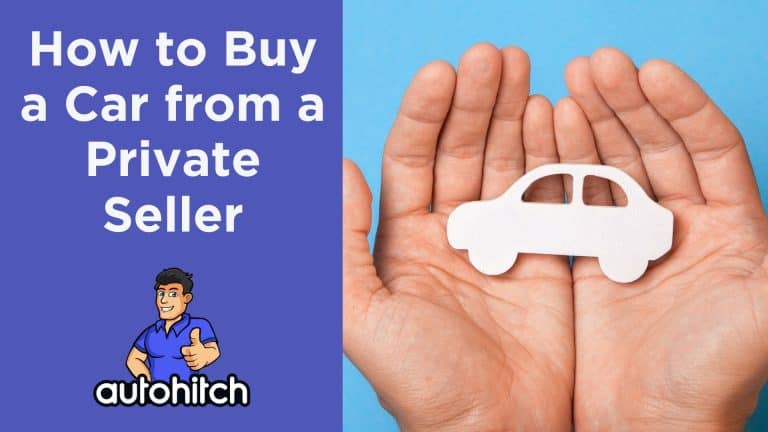As a former owner of a privately owned used car dealership, there were many occasions where my inventory came directly through buying cars from private sellers.
But most people don’t know how to buy a car from a private seller so that you get the best price and avoid paperwork mistakes.
In the guide below, I want to share some tips and tricks to buying cars from private sellers that I had to learn the hard way, so you don’t have to!
Relevant Articles To Read on the Topic:
- When I Buy a Car From a Private Seller Can I Drive It Home
- What to Do After Buying a Used Car From a Private Seller
- What Are Possible Red Flags or Signs of a Scam When Buying a Car
- Can I Sue a Private Seller For Selling Me a Bad Car
- Banks That Finance Private Party Auto Loans
- How To Read A Carfax
Table of Contents
The Pros and Cons Of Buying From a Private Seller
When you purchase a vehicle from a private party there are definitely pros, but also some cons that you should be aware of:
Pros
- Lower prices without dealer fees
- More room to negotiate on price
- Avoid pressure and sales tactics
Cons
- No financing assistance
- No warranties or guarantees
- Must handle paperwork/registration yourself
- Risk of repairs and maintenance
Keep these trade-offs in mind as you evaluate private sale options.
Get Pre-Approved Financing First
If you are not paying with cash, having financing already secured puts you in a better negotiating position and ensures you can move quickly when you find the right car.
- Check rates from banks, credit unions, and other lenders that offer private party auto loans
- Apply for pre-approval on a personal auto loan before shopping
- This allows you to know your budget and monthly payments
- Gives flexibility to negotiate the final sale price
Consider things like:
- Loan amount
- Interest rates
- Term length
- Monthly payments
Shopping around helps you find the most favorable loan terms. Then you won’t feel pressured by any seller to use their financing.
Good cars might be easy to find on Autotrader or Cars.com, but other owners might only opt to list their cars on free sites like Facebook Marketplace or Offer Up.
Research the Vehicle and Seller’s Information Thoroughly
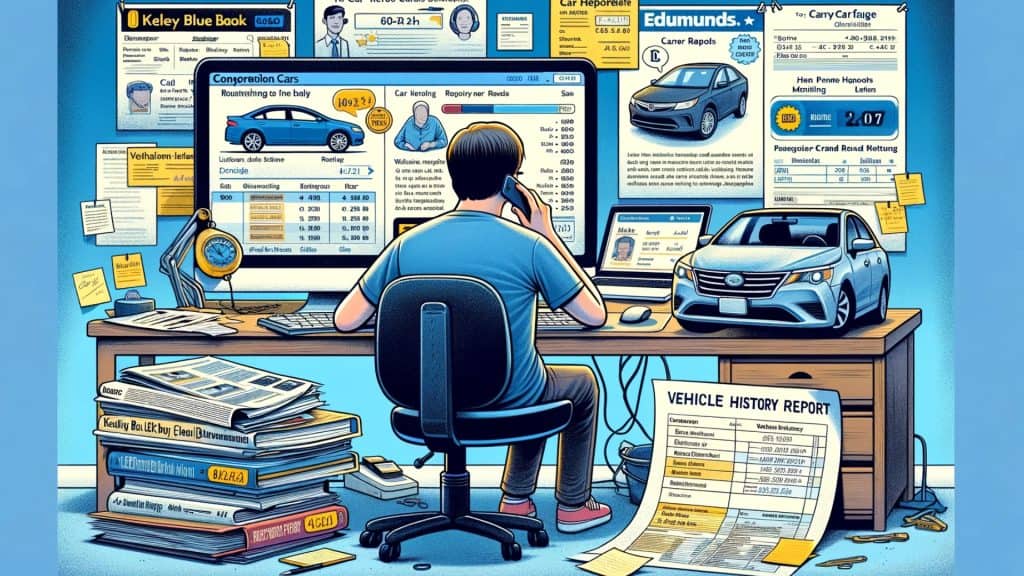
Car Dealers don’t have some magic to finding cars, so I had to start my searches exactly like you will:
Online.
The key to searching for private seller cars is understanding that their owners don’t have the budget of a car dealership.
In my experience, here are the best websites and sources for finding cars being sold private party:
The Best Sites To Find Private Seller Cars
I have arranged this list in the order of what was most successful for me.
- CarGurus
- Facebook Marketplace
- Autotrader
- Cars.com
- Offer Up
- Craiglist
- Kelley Blue Book
- Public Auctions
Auctions require a bit more work, expertise, and savvyness. However, if you have time and the other qualifications I mentioned, they’re a very good place to find privately owned cars at a good price.
Expert Advice: When you find vehicles you think you like, focus on the listings that provide a lot of details and photos over those that appear rushed or lacking valuable information. This is one of the first steps to avoiding scams, bad vehicles, and unlicensed dealers posing as private sellers.
After you have identified the vehicles that are worthy of actually calling about, reach out to the seller with prepared questions about the car’s history and their ownership.
Verify All The Seller’s Information Ahead of Time

Here are a few examples of questions to ask private sellers before potentially wasting your time traveling to see the car:
- How long have you owned the car? Were you the original owner?
- Has the car ever been in an accident or had major repairs?
- Can you provide service records showing maintenance history?
- Is there any existing warranty coverage from the manufacturer?
- Why are you selling the car?
Don’t expect to hear the truth, the whole truth, and nothing but the truth. Rather, I would focus on HOW the seller was answering the questions:
- Were they trying to change the subject?
- Were they answering questions I didn’t ask?
- Were they giving me short, incomplete answers or giving me more details than I even expected?
Avoiding Scams and Bad Situations
Believe it or not, the chances of encountering a car-buying scam actually increase when you’re buying a car from a private party vs a dealership.
Highly relevant article to read: Common Car Scams On Facebook and How To Avoid Them.
Here are a few Red Flags or Signs of a Scam to watch for when purchasing a vehicle from a private seller:
| Red Flag | Potential Issue |
|---|---|
| No title or name mismatch | Car may be stolen |
| Salvage/rebuilt title | Major prior damage |
| Refusal of inspection | Could be hiding problems |
| Insists on Cash Only | Sign of Curbstoning |
| Unusual payment requests | Potential scam |
| Odometer tampering | Inaccurate mileage |
You can avoid being scammed by:
- Verifying all information with CARFAX /AutoCheck vehicle history
- Having a mechanic inspect car thoroughly
- Meeting seller at bank or public place
- Rejecting anything that seems suspicious
Trust your instincts – it’s better to walk away from a questionable sale or seller!
Verify the Seller Has the Title in Their Name
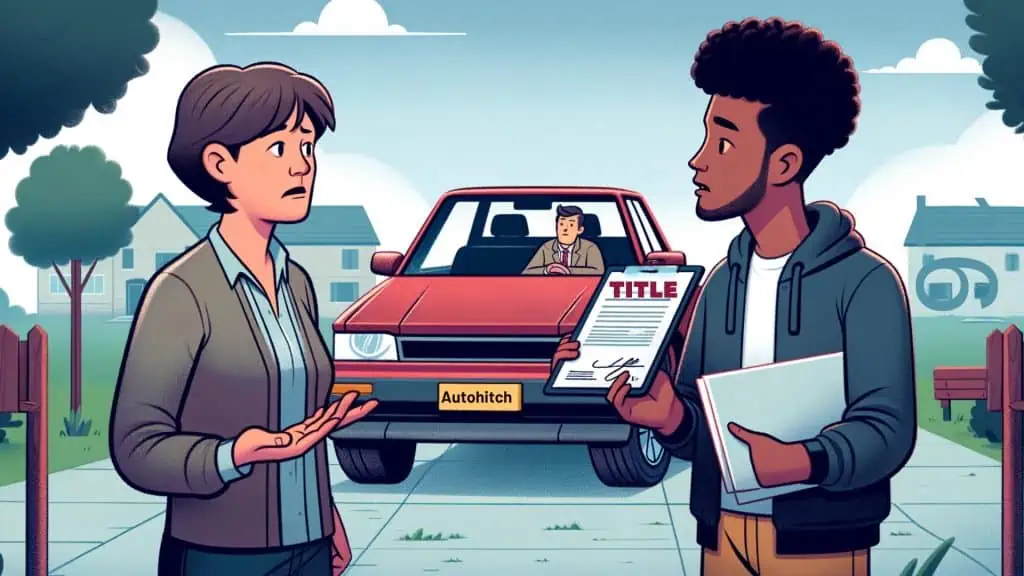
An important early step is to verify the seller has the title in their name, not just possession of it.
Ask (Specifically) if they have the title and if it’s in their name.
Some sellers (Especially unlicensed dealers) try to “jump” the title by selling cars they purchased without registering it first. This is risky, as it could be stolen.
Only buy from the registered owner.
If at any time you feel you are not being treated honestly, say thank you and forget about the car. Considering how much you will spend on a vehicle that falls apart on you, it’s better to be safe than sorry.

No matter what answers you get, your next step before going to see the car is simple:
Ask for the 17-digit VIN and run a vehicle history report from Carfax, AutoCheck, or another provider. Some websites provide basic history information, but you want a “Complete Report.”
Then, cross-reference the report with what the seller told you.
Get Pre-Purchase Inspections
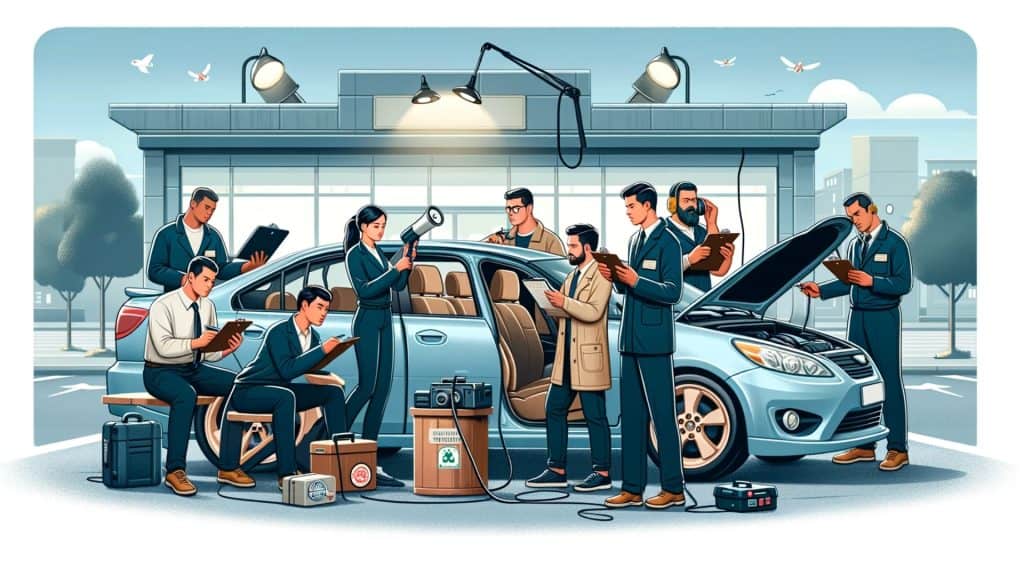
If the car and seller seem promising, arrange to see it in person.
Meet in a public place like a mall parking lot during the day. Bring someone with you if possible and take precautions like photographing the seller’s license.
Someone who is not acting in good faith is likely going to resist these good-faith efforts to conduct a safe and secure transaction.
Thoroughly inspect the exterior, interior, under the hood, and test drive the car. Check for issues like:
- Rust, dents, worn paint
- Tire tread wear
- Pedal wear relative to mileage
- Electronics, seat belts, wipers etc
Listen and, more importantly, feel for any engine or transmission problems during the test drive.
Important Advice: I have many years of experience inspecting used cars, but for most people, I recommend hiring a certified vehicle inspector.
These are typically former dealers or mechanics who will inspect every aspect of the car, including issues with the engine, transmission, frame, suspension, electrical systems, and more that you can’t properly assess yourself.
One such inspection service I have seen around is “Lemond Squad,” but you can also find people working independently who are just as good, if not better!
Avg cost is around $100-$200.
If the seller declines an inspection, it could signal they are hiding major problems!
Use Inspection Results to Negotiate a Better Offer
Armed with insight from the test drive and inspection, you can better gauge the car’s true value.
Hop back online and look at what other private sellers are asking for similar vehicles in similar condition.

Also helpful are sites like KBB, Cargurus, and even our own Autohitch Used Car Pricing Service, which source data from other listings or dealer purchases to determine what a fair value for a used car is.
Point out any issues uncovered and deduct their repair costs from the asking price when negotiating with the motivated seller. Offer less if the problems are severe.
Pay Safely and Transfer Ownership
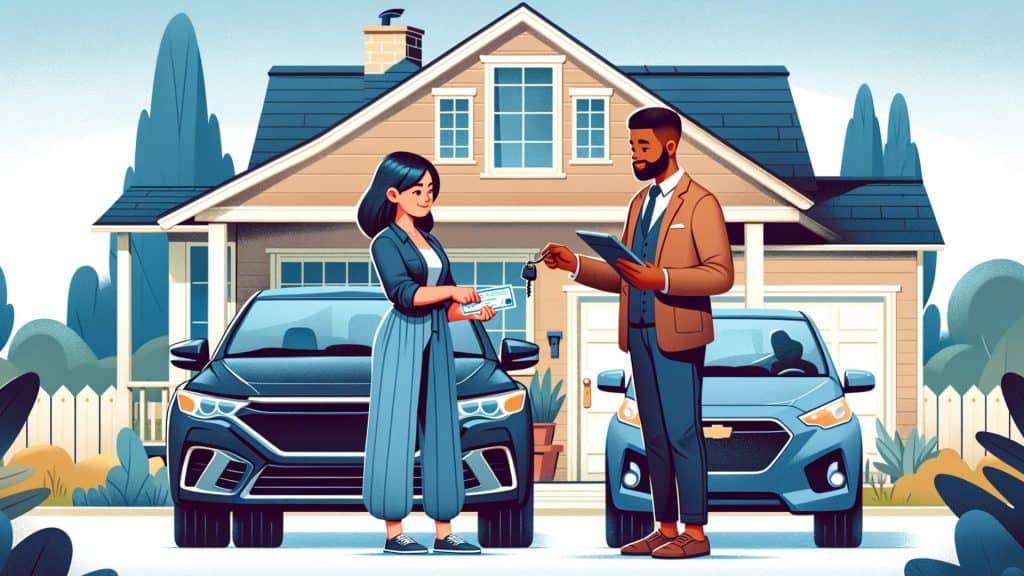
When you’ve agreed on a price, it’s time to pay and complete the sale.
Never wire money or pay online before seeing the car. Request to meet at your bank so you can pay by cashier’s check, exchange it for the keys and title, and drive away securely.
Review the title to ensure no liens are recorded, and the seller’s name matches their ID. Sign the title with the seller, recording the mileage and date. Keep the title safe until you register the car.
Expert Tip: Although I never did this as a licensed dealer, some private care buyers arrange to create a bill of sale that reflects a smaller purchase amount to save on sales tax. I certainly am not advising you to do this because it is not legal; I am simply keeping you informed.
What Paperwork Do I Need to Buy a Car From a Private Seller

After buying the used car from a private party, you’ll need to take care of registering the vehicle, transferring the title to your name, and obtaining insurance for legal operation and coverage.
Expert tip: If spending hours at the DMV is something you’d like to avoid, you’re not alone! That’s where tag and title agencies come in. Simply Google “Tag and Title Agencies Near Me,” and you should find plenty of local services that will handle the entire process for you, skipping the DMV, for a minimal charge.
Your State DMV website will best explain what paperwork you will need to register a used car. You’ll commonly need to provide:
- Title signed by the seller
- Bill of Sale showing what you paid (For Sales Tax Purposes)
- Proof of insurance
- Passing emissions test (Only in certain states)
- Fees for sales tax and registration
Also, don’t forget to call your insurance agent to add the car on to your policy.
Provide the VIN, mileage, and purchase documentation. Consider adding gap insurance when financing to protect against losses.
Buying a Car Privately Checklist
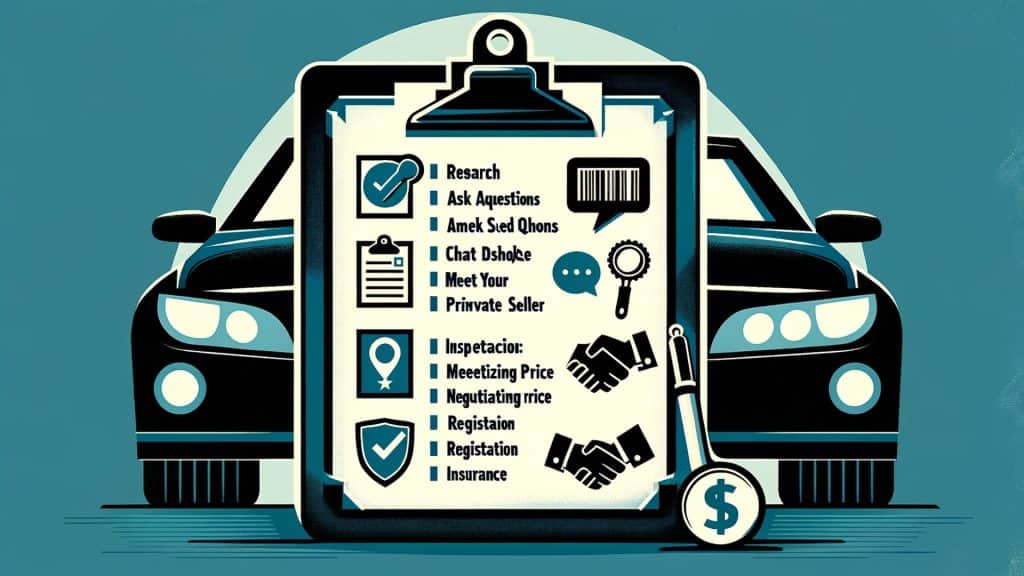
Follow this cheat sheet when buying a used car from a private seller:
✓ Research vehicles and prices
✓ Ask the seller detailed history questions
✓ Get VIN and run a vehicle history report
✓ Meet the seller in a public place
✓ Thoroughly inspect the exterior, interior, test drive
✓ Get a pre-purchase inspection
✓ Negotiate price based on condition
✓ Pay by cashier’s check with title transfer
✓ Register the car with DMV in your name
✓ Arrange insurance coverage
Key Facts and Figures on Private Party Car Sales
Private party sales make up a significant portion of the used car market in the United States:
- In July 2022, over 1.4 million used vehicles were sold between private parties in the U.S.
- Total used light vehicle sales reached 38.6 million units in 2022.
- Private party sales accounted for 48% of used car sales in 2021.
- A survey found 70% of Americans would consider a used car, but only 12% preferred buying from an individual.
- Private party sales offer advantages like lower prices and less skilled negotiators.
- But there are disadvantages like lack of protections and need to arrange financing.
- Dealers expect online sales, including private parties, to rise to 20-40% by 2030.
My Final Thoughts
While it takes some extra effort, buying a used car from an individual can save you money.
Follow this guide, trust your instincts, and don’t rush the process.
Take your time researching, inspecting, and verifying the vehicle’s history and condition before handing over your cash. With the right precautions, you can score an affordable, reliable used car from a private seller.
Sources and Citations:
- https://www.statista.com/statistics/1325052/us-used-vehicles-sold-monthly-by-private-parties/
- https://www.statista.com/statistics/183713/value-of-us-passenger-cas-sales-and-leases-since-1990/
- https://www.coxautoinc.com/market-insights/estimated-monthly-used-vehicle-saar-and-volume/
- https://www.mckinsey.com/industries/automotive-and-assembly/our-insights/data-and-analytics-in-the-drivers-seat-of-the-used-car-market
- https://www.autotrader.com/car-shopping/buying-a-used-car-private-seller-or-dealer-221311
- https://www.ebay.com/motors/blog/five-expert-tips-for-buying-a-car-from-a-private-seller/
- https://www.wikihow.com/Buy-a-Used-Car-from-a-Private-Party

